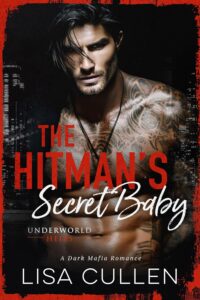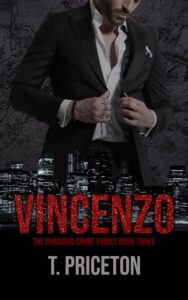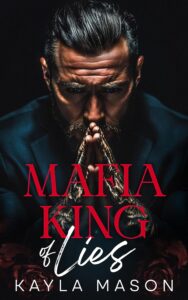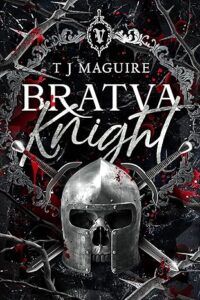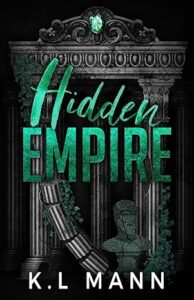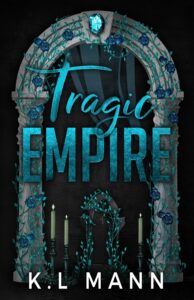Five years later
The floor under my boots is old Sicilian tile, hard and cold, worn smooth in places from years of use.
It stinks of sweat and rust, not to mention the burn of something sour and human: fresh fear rising from the man in the chair.
He knows what’s coming.
I take my time rolling up my sleeves, folding the black fabric past my elbows without looking away.
Each turn is slow, exact, because in this line of work, you don’t rush.
You don’t fidget.
You don’t show nerves.
My audience is bound at the wrists, duct tape layered with rope, ankles kicked out in front of him like he’s already given up trying to fight.
Blood streaks the side of his face.
There’s not much yet. It’s just enough to make him blink through it while he stares up at me with those disconcertingly bright eyes.
He’s sniffling now, making those quiet choking sounds that happen when the body gets ahead of the mind, when survival instincts kick in before logic has a chance to form a plan.
He put up a good fight, even managed to inflict a minor injury on me, but in the end, this is what it all comes down to.
I’ve seen it too many times—the moment when a man realizes that his screams won’t reach anyone, and even if they do, no one will come.
I crouch in front of him, watching the way his shoulders flinch just from the sound of my knuckles cracking.
He’s young.
Thought he could make a little extra on the side by trading routes, supply docks, a few names.
Someone whispered promises into his ear, probably a rival family dangling just enough to make the risk feel worth it.
It never is.
‘Names. Now.’
He whimpers, more noise than words, his eyes darting toward the basement stairs like salvation might still be waiting up there.
Patience. Not force.
That’s what men like him require.
Force makes them scream.
Patience makes them talk.
‘You’re not going to die here,’ I murmur, testing my blade against my thumb. ‘But you will beg.’
He whimpers again.
Tries to speak.
His tongue fumbles around the cotton of his fear.
‘No more lies,’ I say, and press the edge of the blade lightly under his ear. It doesn’t cut, just kisses the skin. ‘Or I make a map out of you.’
He begins to sob in earnest.
I don’t care.
The crying is just another kind of silence, but it won’t last.
The history of our business is written in blood and bricks, old oaths and family names etched into marble headstones.
Salvatore. Moretti. Conti.
In this world, power doesn’t shift, it calcifies.
When it cracks, the fallout lingers for decades.
Luca understood that better than anyone.
He built this new empire on a blueprint older than the city itself, took the shattered pieces left after the collapse of the old dons, and restructured the organization into a fortress, cold and elegant and impenetrable.
Except once.
Five years ago, the walls cracked with the disappearance of Valentina. The Don’s wife, gone early mroning, with no note, no farewell, no sign of a struggle.
One moment she was there, and the next she was gone.
Of course, there were rumors.
A woman like Valentina, elegant and exacting, did not simply walk into the dark without someone helping her disappear.
Her disappearance was not a private affair.
It was a rupture.
For a few days, the city held its breath.
Then a name started to circulate.
Not official, nor confirmed.
But it was spoken often enough in the right rooms that it might as well have been.
Aria Lombardi.
The youngest daughter of a once-formidable house.
Once that name reached the boss, the response was immediate.
No Don can afford the perception of weakness, especially not in any organization where loyalty is measured in silence and strength is defined by what happens when someone comes for your blood.
A man can lose a soldier and move forward.
He can even lose a brother.
But a wife is different.
A wife is family in the truest, most public sense of the word.
If she disappears and there is no response, then the foundation crumbles.
People begin to ask questions.
People begin to make moves.
Luca started with the Lombardi family’s offshore holdings.
Their accounts in Zurich and Luxembourg were frozen through quiet channels, favors called in from men who owed him more than money.
Then came the business pressure.
Construction was halted across five sites in Naples, Palermo, and New Jersey.
Licenses were withdrawn.
Inspectors appeared overnight.
Politicians once loyal to the Lombardis no longer returned their calls.
Every joint venture was reevaluated, then dismantled.
Contracts were revoked, land deals stalled, charitable foundations shuttered for audit.
What had taken the Lombardis three generations to build was disassembled in less than six months.
Their sons were the first to run.
The two youngest left under new documents, slipping into Northern Europe before the pressure turned into charges.
The eldest remained, insisting he could hold the family together, but he was forced to sell off properties to cover legal costs and settle internal debts.
Allies pulled away.
No one wanted to be standing too close when the house finally collapsed.
The old man, once a fixture at every public function, every gala, every backroom negotiation that mattered, withdrew entirely.
He stopped appearing in the press.
He no longer attended council dinners or received visitors at the estate.
His name remained on the legal documents, but the force behind it had been broken.
What remained was title without power, weight without leverage.
And yet, the peace held.
Because of Aria, or rather, the absence of her.
It was the nature of unspoken politics that kept his hands from closing entirely around what little remained of the Lombardi name.
Aria, for all her fire, had been little more than a pawn as far as her family was concerned, a daughter offered up in silence, her body and loyalty exchanged like currency.
And yet, when she vanished and whispers of tragedy began to spiral through the city, it would not have served Luca’s purpose to annihilate a family cloaked in the trappings of grief.
To the outside world, they were parents mourning a lost child, not architects of betrayal.
So, he let them live, because in a world ruled by shadows and spectacle, the illusion of restraint could be just as powerful as vengeance itself.
I rise slowly, stepping closer to the man in the chair.
His breathing is ragged now, each inhale a tremble, but I don’t move fast. I let the moment settle around him.
Let the weight of what’s coming grow teeth.
‘I can make this slow,’ I tell him. ‘Or I can make it art.’
A muffled sound catches my attention from the stairs behind me.
Footsteps.
Too light to be one of the soldiers.
Seconds later, there comes the sound of someone hurling.
It has to be Zio, my nephew, and now, the rookie.
Barely out of adolescence, eager for blood, but not yet accustomed to the sight or smell of it.
I make a mental note to remind my nephew later—this is not about volume.
It is about stamina.
Let fear do the work, not your voice.
Let the man tell you the truth because he needs to, not because you demand it.
It’s the difference between extraction and chaos.
Between fear and theater.
Blood is the ink.
But silence writes the truth.
And I have never forgotten how to listen.
It’s the first lesson you learn in our world.
Before the blade, before the bullet, before the oath and the suit and the silence.
Listen, and you will survive.
Listen long enough, and you will rule.
The man in the chair breaks before the next breath.
It takes nothing more. His lungs collapse around a sob, his voice unraveling like an old thread.
‘I told Marzelli everything,’ he chokes. ‘The docks, the containers, the tags on the trucks. The shipments that came in through Grimaldi’s men, the payment channels from Palermo. He gave me cash up front. Said the Salvatores wouldn’t notice a few gaps in a port ledger.’
He wheezes, his chest jumping against the tight bands of rope.
‘Please,’ he says. ‘I didn’t know what they were planning with the intel. I thought it was just smuggling—just muscle for some rival crew. I swear I didn’t know it would go this high.’
He cries the last part. It echoes, faint and cracked, like a child’s voice inside a cathedral.
I don’t ask him to repeat it.
I don’t give him a nod, or a prayer, or a final confession.
The truth is already spilled. Every bit of it. Like blood.
‘Aria Lombardi—’
My whole body goes still. By now, there are many rumors circulating this city, and one of the more subdued ones is that the Lombardi family’s jewel was secretly consorting with the Salvatore hitman, aka me.
Luca never questioned me about it, and I never let it get in the way of my job.
But, in the stillness of this moment, I cannot pretend that hearing her name spoken out loud after five years does not make my almost nonexistent heart lurch.
‘What did you say?’ My voice has dropped dangerously low.
‘She’s not dead,’ he blubbers. ‘P—please—I know who—’
On the off chance that he does speak the truth, I cannot have him reveal Aria’s situation in a room full of people who would hunt her down to please the boss.
So, in the next instant, I draw out the gun, chrome black, clean, and still warm from the last job.
I cock the slide, and pull the trigger.
The bullet lands with a low thump.
Skull against concrete.
Bone and silence.
His body topples over, still tied to the chair, falling like a monument razed in slow motion.
There’s a small twitch.
A final breath.
Then nothing.
The others wait.
I do not.
I walk out of the room without casting a glance back.
I’ve always believed in respect for the dead.
But not like this. Not when the soul has already left and the mess behind is just flesh cooling on stone.
Outside, the hallway is quiet.
Damp walls and exposed pipes.
The old slaughterhouse we’ve repurposed for such business still hums with the memory of what it once was.
Lorenzo steps forward, his face pale.
Adriano lights a cigarette with the same callous rhythm I’ve seen since we were boys.
My nephew is less steady.
His hands twitch as he adjusts his collar, eyes flicking down to my side.
‘Enzo,’ he says, voice rough. ‘You’re bleeding.’
I glance down, remembering. He’s right.
I do have a thin red line at my ribs, cut through my shirt from when the rat got one last burst of courage and fought against me.
The wound stings, but it’s shallow.
Zio looks like he’s about to call in a medical team.
I place a hand on his shoulder and pat him once. ‘They’re your medals,’ I say. ‘You should flaunt them.’
He blinks, his eyes wide, worried, and eager to learn.
‘In our line of business,’ I continue, ‘you must deal with blood and death. If you want to lead, you must carry shake hands with them like old friends.’
He nods, chest puffing out.
I let him have it.
There will be darker days, harder nights.
If he thinks this is pain, he hasn’t yet known loss.
Adriano clears his throat. ‘What did you think he was going on about?’
He’s referring to Aria. I feel that same tightening in my insides, but I’m careful not to show it. ‘He thought it would buy him more time.’
I speak with an air of absolute finality, and Adriano nods and falls back respectfully.
If I do not indulge gossip, it dies.
We move toward the exit in silence, the cold air of the alley catching in the folds of our coats as the heavy steel doors groan closed behind us.
I tuck my gun into a hidden holster beneath my jacket, flicking the spent cartridge from my jacket pocket like lint.
Cristiano is waiting by the car, hands in his pockets, coat perfectly tailored to the frame of a man who knows how power should look.
His jaw is clean shaven today, his mouth tilted in something close to a smirk.
‘Efficient,’ he says.
I shrug. ‘He talked.’
Cristiano gives a nod, stepping aside so I can slide into the back seat.
The engine hums low.
A quiet purr like a beast that’s fed but not full.
Giovanni is in the front.
He doesn’t turn around, just taps his finger once on the steering wheel and mutters, ‘Knew he would. Rats always do.’
Silence settles over us like a shroud as we pull away from the curb, the old slaughterhouse disappearing behind us like a shadow folded into dusk.
The streets are quiet now.
Nuova Speranza has learned to bow its head at the right time. Shopfronts lower their shutters earlier.
Lights dim faster when the Salvatores move through the city’s veins.
Cristiano glances at me. ‘Something on your mind?’ he asks, voice too casual to be innocent.
I don’t answer.
Because the scope of what could be said is far too much to be put into mere words, and if what that man said is true—if Aria isn’t dead—then everything I thought I buried five years ago just clawed its way back to the surface.
Giovanni taps the steering wheel again. ‘Boss wants us at the villa tomorrow morning. Something about a port deal with the Hungarians. He wants us sharp.’
I nod once, but my thoughts are elsewhere.
I will nod at Luca and tell him the Marzelli breach has been handled.
I will look Cristiano in the eye and pretend I am not turning over every name, every face, every possibility behind my calm expression.
It is all I can do to give myself more time to know where Aria is before she’s found by the boss.
And if she’s really out there, she’s coming home, where she belongs, to me.



